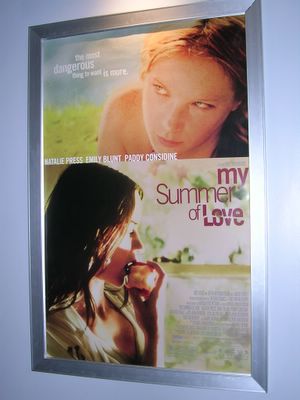
I was reminded today how fortunate we are to have the Deep Focus Film Festival at a great theater. I've attended Roger Ebert's Overlooked Film Festival and the Cleveland International Film Festival. There are many things to recommend about both of those festivals, but the Arena Grand is, without a doubt, a more comfortable place to watch several movies in one day. Not to sound like the Chamber of Commerce or Visitors and Convention Bureau, but don't forget the convenient parking, several Arena District restaurants from which to choose for sustenance between films, and ample time to eat a meal. If you can't tell, I'm so happy that an event like this is being held where I live. Getting out of town for film festivals can provide a welcome break from routine, but it's also terrific to attend one where I can see a bunch of movies, go home, check the status of my non-hitting fantasy baseball team, and then stay up far later than I should typing reports for the blog instead of getting some sleep.
Day 3 was the first that confronted the most obsessive festival attendees with two films playing at the same time. It's not possible to see everything--trust me, I've plotted out the films and showtimes--but you can catch all but one.
Leftchannel's music video for RJD2's "1976" was an appropriate lead-in for the ballroom-dancing kids of MAD HOT BALLROOM. I've always envisioned the RJD2 song as a 1970s game show theme, but Leftchannel's animation of photographs of Cuban life was a perfect marriage of images and sound.
MAD HOT BALLROOM documents precocious fifth graders in the New York public school system learning how to dance and the teachers who are passionate about the Dancing Classrooms program. It's exactly the sort of film for which "feel-good" and "crowd-pleasing" were intended. The Deep Focus audience, which had the pleasant surprise of including some kids, would probably agree. At the risk of sounding like a grouch, I was bored more than I was charmed.
Director Marilyn Agrelo tracks the progress at schools in Bensonhurst, Tribeca, and Washington Heights as the students learn dances in preparation for the citywide competition. The children are taught the tango, rumba, swing, foxtrot, and merengue (not meringue, as I jotted in my notepad). More than 60 schools take part in the contest, but the purpose of the program isn't winning a trophy but exposing the children to the arts and instilling confidence and discipline.
Dancing is MAD HOT BALLROOM'S focus, but Agrelo also observes how the kids, on the cusp of interest in dating, grow into their gender roles. The fifth graders are still young enough that they don't seem self-conscious in front of the camera or around one another, but most acknowledge, often in humorous ways, that they're aware of the feelings that they have for members of the opposite sex. The girls seem savvier than the boys, which, as Emma would tell you, shouldn't come as a surprise.
Unlike SPELLBOUND, another documentary about children in competition, MAD HOT BALLROOM doesn't acquaint us very well with the kids. Many are interviewed, and some stand out more than others. The uncommonly serious Cyrus, theory-filled Emma, and Wilson, the smoothest of all the dancers, make the strongest impressions, but we get to know them as types more than as individuals.
MAD HOT BALLROOM falls into the trap that the teachers avoid. The competition becomes the center of attention, and that's when the film falls into a numbing repetition. Since three schools' progress must be followed, we see each competing in the rounds leading up to and including the finals. At the finals Agrelo shows each dance more or less in its entirety, the alternates getting their chance to shine, and then the dance-off to determine the winner among the three finalists awarded the gold level of achievement. With school funding crises forcing districts to chop arts programs, it's understandable why Agrelo would want to show Dancing Classrooms' impact on these children, but at 110 minutes, the film is much longer than it needs to be. The kids are cute and the intentions are good, but ultimately MAD HOT BALLROOM plays like a teacher's presentation to the school board about the importance of arts education.

As Zeus took the form of a swan to seduce Leda, Paul Pavlikovsky's MY SUMMER OF LOVE promises a scorching romance between two girls to entice the viewer, although it proves to be something else altogether.
Despite their differences teenagers Mona (Nathalie Press) and Tamsin (Emily Blunt) form an intense friendship that leads to love. Red-haired, freckled Mona lives above a pub that her born again brother Phil (Paddy Considine) converts into a spiritual meeting place. She's none too pleased that Phil found God in prison. Along comes Tamsin, a beautiful boarding school student who has returned to her parents' enormous home for the summer. Mona and Tamsin bond over lost family members and those still around who they feel have betrayed them. They're an inseparable duo who bristle at Phil's warnings of the devil's temptations at work in their town.
The devil doesn't have horns, a tail, and a pitchfork but a friendly face and seductive lies. Pavlikovsky keeps MY SUMMER OF LOVE compelling because we're never entirely sure if Mona should doubt Phil's conversion or if he has insight into unseen evils plaguing the town. Out of his conviction Phil erects a large cross at the top of the hill in the hope of saving others. The power of transformation runs deep through the film, not only with that specific religious symbol but also with words, images, and music. The swan plays a key role, whether as the name of the pub before it changes into a place of worship, a knickknack Mona's mother had, or the classical music Tamsin plays on her cello. Water and its importance in key moments of transformation comes into play as well.
Coupled with Ryszard Lenczewski's picturesque cinematography, Press and Blunt's natural performances communicate a palpable sense of the summer's heat and the hazy days of adolescence and ardor.
The last film of the night was ONE MISSED CALL (CHAKUSHIN ARI) from prolific Japanese director Takashi Miike. Of his films that I've come across, this is the most conventional and accessible, but that doesn't mean it's without merit. Who better to exploit an ominous ring-tone, the thunderous crunch of toenail clipping, an inhaler's whoosh, and a peephole phobia for scares than one of the preeminent Asian extreme directors?
In ONE MISSED CALL young people receive cell phone messages from themselves in the future. They soon learn that these missed calls are omens of their impending deaths. Try as she might, Yumi (Kou Shibasaki) cannot avoid getting one of these messages. She and Yamashita (Shin'ichi Tsutsumi), whose sister was one of the first to fall prey to the deadly dialer, race against the clock to solve the mystery before Yumi becomes the latest victim.
Miike reins in his anything goes impulses--there are no random claymation sequences or other giddily insane developments that made THE HAPPINESS OF THE KATAKURIS constantly surprising--but still smuggles in his sense of humor and flair for the grotesque, often at the same time. This includes a severed arm dialing a cell phone, a decapitated head in the foreground and the body stumbling around in the background, and a reanimated corpse with chunks of wet flesh sloughing off of it. For good measure, he throws in a vicious criticism of reality television when one of Yumi's doomed friends is whisked away for a live special counting down her final seconds. (As over the top as the show is, it plays like something the Fox network would do in the blink of an eye.) This is what passes for a straightforward Miike film. No wonder this will be the first of his films Hollywood will try to remake.
In ONE MISSED CALL tension builds within scenes and creeps from scene to scene. Miike prefers for most of the scares to come gradually, with a select blast of unexpected jolts to keep the audience off-guard. The film ends with a flurry of frights--and probably a false ending or two too many--that have been laying in reserve.
As tends to be the case with other J-horror films, I'm not sure that everything in ONE MISSED CALL makes sense. Actually, I'm certain that it doesn't. If anything, the ending confuses matters rather than clarifying them. Rarely has a sunny end credits pop song sounded so incongruous with what preceded it. The overall theme deals with the inability to outrun abuse even through the distance of years, but as the story becomes more muddled, the statement about abuse passed through generations also is less clear. Regardless, Miike's dread-inducing skills and handling of tone trump any mystifying narrative turns.
Wall Street hosted a post-screening party, but as the occasionally diligent writer I am, I passed in favor of coming home to begin work on this entry. I'll have to get the scoop today.
Audience turnout for the festival has been encouraging so far. Even though these four days have been very competitive for entertainment dollars--Green Day, Ryan Adams, The Decemberists, and Jon Stewart have been in concert--the Deep Focus Film Fest has factored into many people's plans. The gorgeous weather isn't doing us any favors, but at worst I think we're meeting our expectations. There is still one more day of great films, so come spend Mother's Day with us. We have the U.S. theatrical premiere of ZERO DEGREES OF SEPARATION, which includes an introduction by and Q&A with director Elle Flanders. Closing night film MURDERBALL is sure to end the festival with a bang. It may be my favorite out of everything we're showing.
Hey Mark, don't worry about your gushings over the festival and the theater. Had a great time... and fell head over heels in love with the Arena Grand. Multiplexes should not be this outrageously great. How's that for a Chamber of Commerce shill?
ReplyDeleteGlad I could hook up with you, by the way, if only for a few minutes.